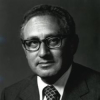Henry A. Kissinger

Henry A. Kissinger
Henry Alfred Kissingeris an American diplomat and political scientist. He served as National Security Advisor and later concurrently as United States Secretary of State in the administrations of presidents Richard Nixon and Gerald Ford. For his actions negotiating the ceasefire in Vietnam, Kissinger received the 1973 Nobel Peace Prize under controversial circumstances, with two members of the committee resigning in protest. Kissinger later sought, unsuccessfully, to return the prize. After his term, his advice has been sought by world leaders...
NationalityGerman
ProfessionStatesman
Date of Birth27 May 1923
CountryGermany
I do not know what will happen in China politically. I do know that it is impossible to maintain the communist system or probably even a strict one-party system when the economy becomes so pluralistic. Now, what form that takes and what institutions will evolve, I do not have a clear view about. I do not think the United States, as a general principle, ought to intervene in this.
Everybody who has dealt with China over an extended period of time has come to more or less the same conclusions. There are nuances of differences, but not fundamental differences. I think that President Bush was heading in this direction, and I have no doubt that he will again wind up in this position. But right now he has to be preoccupied with the atrocity committed in New York and Washington.
In my particular case foreign policy happens to be my hobby, my consuming interest. I had spent decades studying it.
The absence of alternatives clears the mind marvelously.
There cannot be a crisis next week. My schedule is already full.
The position is that stability and peace in Asia depend on a cooperative relationship between China and the United States.
Does anyone have any questions for my answers?
I think that his [Obama's] task will be to develop an overall strategy for America in this period, when really a New World Order can be created.
High office teaches decision making, not substance. It consumes intellectual capital; it does not create it. Most high officials leave office with the perceptions and insights with which they entered; they learn how to make decisions but not what decisions to make.
A diamond is a chunk of coal that is made good under pressure.
Peace depends ultimately not on political arrangements but on the conscience of mankind.
Leaders are responsible not for running public opinion polls but for the consequences of their actions.
For the West, the demonization of Vladimir Putin is not a policy; it is an alibi for the absence of one. Putin is a serious strategist – on the premises of Russian history. Understanding US values and psychology are not his strong suits. Nor has understanding Russian history and psychology been a strong point among US policymakers.’
You should not go to war for the privilege of withdrawal. You need to define your objective and the outcome, and it cannot be the removal of one man.